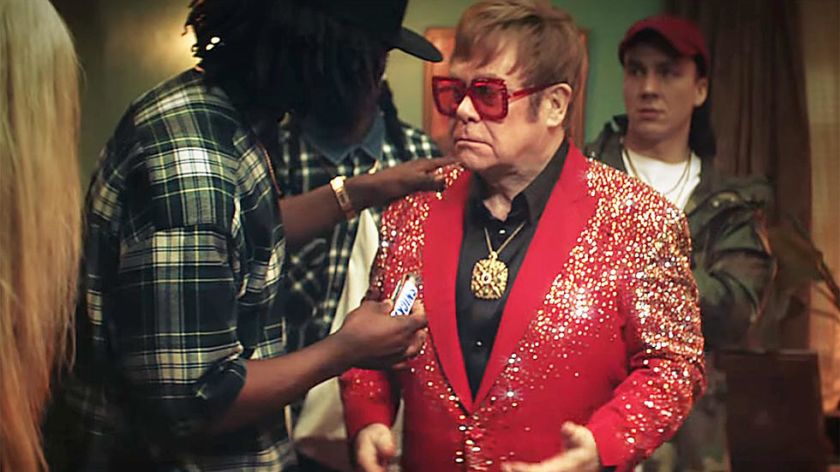During a depression, it’s hard to tell when you are yourself
-
 Elton John in a commercial for Snickers. Still from YouTube
Elton John in a commercial for Snickers. Still from YouTube
It is a much-used phrase: ‘I don’t feel like myself’. But what do we actually mean when we say that? This is the question philosopher Roy Dings (29) studied in the past few years. Today, he receives his doctorate degree.
An interview about a philosophical topic is often complicated. Especially in this case, because Roy Dings has lost his voice. That’s why this conversation takes place through e-mail.
When are we actually ourselves?
‘Well, there is no way to answer that question unambiguously. There are so many reasons for someone to feel different in daily life. Think of life events like being fired, losing a loved one, retirement, the birth of a first child. You can even feel unlike yourself when you are hungry – look at the Snickers commercial: ‘you are not you when you’re hungry’.’
Why is it important to think about this question?
‘Sometimes, confrontation with self-ambiguity – as I call it in my dissertation – is a daily event. Think of psychiatric disorders like depression, my main point of focus. Psychiatric patients can doubt whether a certain thought, act, or emotion is ‘theirs’ or if it ‘belongs to the disorder’. This question is on many patients’ minds, but is hard to answer.’
‘In the Snickers example, it is clear why the rapper in the commercial is suddenly singing like Elton John: it’s because he is hungry. In the case of a psychiatric disorder, a clear, identifiable reason for depressed feelings is rare. They can be the result of stress, a social stigma, serotonin levels in the brain, antidepressants, upbringing, etcetera. Medical science does not have the answers to this.’

Why is that?
‘The question ‘how do I relate to my disorder’ is not an empirical question, but a conceptual one – it is not possible to answer it with a test or a medical examination.’
And philosophy is able to answer it?
‘Well, in contrast to medical science, the humanities deal with concepts like ‘self’ and ‘identity’ all the time. Philosophy can help clear up conceptual questions like that.’
How did you research this?
‘I conducted theoretical, conceptual analyses, but I also worked together with psychiatrists. I attended interviews patients had with their psychiatrists and I reviewed them with the medical professional. On top of that, I studied how these problems are represented in the media, and how people in my personal surroundings think about this. Even though this is strictly not scientific methodology, it offers a touchstone for philosophical thinking – to make sure it still relates to people’s everyday reality.’
‘Many patients are relieved when they hear about my research’
‘In the resulting dissertation, I have identified some problems patients can face when they try to clarify the relationship between themselves and the disorder. People tend to think that words like depression and autism have a basis, a concrete thing you can point out: ‘something’ in your brain or genes. We call that ‘reification’. The question ‘how do I relate to my disorder’ technically means ‘how do these two things relate to each other’. But it isn’t possible to connect depression to a clear, assignable entity – so the question is unanswerable.’
And that’s a problem?
‘Yes. Many patients are relieved when they hear about my research. Mental healthcare does not have enough attention for this topic, I feel. Partially because people do not know how to deal with someone who is not feeling well, because something like that is hard to put into words. My dissertation is meant to improve that, by finding the right words.’
Do you have a recommendation for doctors?
‘I have worked with a number of psychiatrists and have regularly met patients, when I gave lectures, for example. It would be good if these problems become more pressing for professionals in mental healthcare. For now, it is important that there’s more discussion about people in relation to their disorder, in healthcare and in society. And that there’s attention for the philosophical questions which come with that.’
Why does this topic interest you?
‘Being yourself is an important societal topic. On the one hand, the focus in Western society is on authenticity, on the other it is pretty normal in 2020 to have a psychiatric disorder or know somebody who does. When you ‘are yourself’, is eminently a philosophical question with real consequences, and as a philosopher I like to engage in those topics.’



